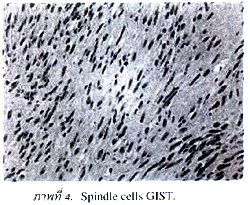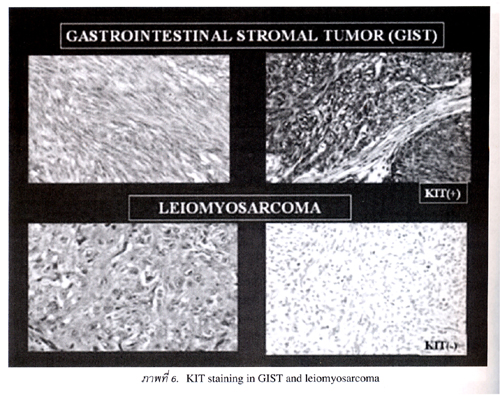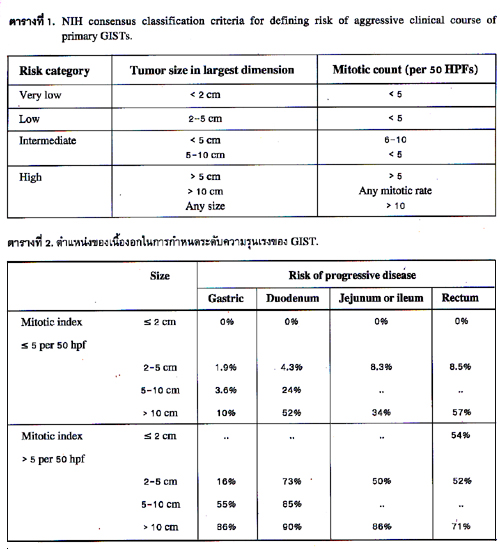Q : การวินิจฉัยทาง pathology ทำอย่างไร
A : GIST ส่วนใหญ่จะมีลักษณะทาง histology 3 แบบ คือ16
1. Spindle cells เป็นส่วนใหญ่ (เป็นลักษณะที่พบบ่อยที่สุด).
2. Epithelioid cells เป็นส่วนใหญ่.
3. ผสมกันทั้ง spindle cells และ epithelioid cells.

Differential diagnosis ของ spindle cell GIST (ภาพที่ 4) ได้แก่ leiomyosarcoma, leiomyoma, malignant melanoma, chwannoma, malignant peripheral nerve sheath tumor, fibromatosis(desmoid tumor), inflammatory myofibroblastic tumor, solitary fibrous tumor และ sarcomatoid carcinoma.16

ส่วน differential diagnosis ของ epithelioid GIST (ภาพที่ 5) ได้แก่ neuroendocrine carcinoma, malignant melanoma, epithelioid variants of leiomyosarcoma, malignant peripheral nerve sheath tumor และ angiosarcoma.16
Immunohistochemical profile ของ GIST เป็นส่วนสำคัญในการวินิจฉัย GIST ซึ่งประกอบไปด้วย28
¾ KIT (CD117) : 95% positive .
¾ CD34 : 60-70% positive.
¾ SMA : 30-40% positive.
¾ S-100 protein : 5% positive.
¾ Desmin : 1-2% positive.
¾ Keratin : 1-2% positive.
โดยทั่วไปการย้อมติดสี KIT ของ GIST (ภาพที่ 6) จะเป็นแบบ strongly and diffuse positive ส่วนการย้อมติดสี CD34 และ SMA อาจจะเป็นแบบ diffuse หรือ focal ก็ได้ สำหรับ markers อื่นๆ หากย้อมติดมักจะติดสีจางๆ และเป็นหย่อมเล็กๆ.

อย่างไรก็ตาม ประมาณร้อยละ 5 ของ GIST จะไม่สามารถย้อมติด KIT ได้ ซึ่งจัดเป็นกลุ่ม KIT-negative GISTs29,30 ซึ่งอาจต้องทำการตรวจด้วย gene analysis สำหรับ KIT และ PDGFRA. นอกจากนี้ยังมีการใช้ immunomarkers เช่น protein kinase C theta (PKCtheta), PDGFRA และ DOG-1 แต่ข้อมูลในการนำมาใช้ยังไม่เพียงพอ.31-33
Q : Prognosis ของ GIST เป็นอย่างไร?
A : ในปัจจุบัน เราไม่จัดว่า GIST เป็น benign tumor อีกต่อไป เนื่องจากทุกๆ GIST สามารถมี malignant potential ได้ ทั้งนี้ขึ้นกับขนาด และ mitotic index ซึ่ง Dr.Fletcher และคณะ ได้มีการประชุมในปี 2002 และได้มีการกำหนดระดับความรุนแรงของ GIST โดยใช้ขนาด และ mitotic index ดังที่กล่าวมาข้างต้น (ตารางที่ 1).28

ตำแหน่งของเนื้องอกที่พบก็เป็นปัจจัยสำคัญ จากการศึกษาพบว่า GIST ที่พบบริเวณกระเพาะอาหาร จะมีความรุนแรงน้อยกว่า GIST ที่พบบริเวณส่วนปลายกว่าของทางเดินอาหาร ดังนั้นในปี 2006 Dr.Miettinen และคณะ จึงได้เพิ่มตำแหน่งของเนื้องอกลงไปในการกำหนดระดับความรุนแรงของ GIST ด้วย (ตารางที่ 2).34
ปัจจัยอื่นๆ ที่ได้นำมาใช้ศึกษาเปรียบเทียบ เพื่อช่วยในการพยากรณ์โรค ได้แก่ kinase mutation status โดยจากการศึกษาพบว่า ผู้ป่วย GIST ที่มี mutation ที่ KIT exon 11 จะมีพยากรณ์โรคแย่กว่าคนที่มี mutation ที่ exon อื่น หรือมี mutation ที่ PDGFRA แต่กลับเป็นตัว predictor ที่ดีที่บ่งว่าจะตอบสนองต่อการรักษาด้วยยา imatinib mesylate.7,35 อย่างไรก็ตาม ในปัจจุบันยังไม่มีข้อมูลที่เพียงพอสำหรับการนำ kinase mutation status มาเพิ่มในการกำหนดระดับความรุนแรงของ GIST.16
เอกสารอ้างอิง
1. Miettinen M, Lasota J. Gastrointestinal stromal tumors-definition, clinical, histological, im-munohistochemical, and molecular genetic features and differential diagnosis. Virchows Arch 2001; 438:1-12.
2. Hirota S, Isozaki K, Moriyama Y, et al. Gain-of-function mutations of c-kit in human gastrointestinal stromal tumors. Science 1998; 279:577-80.
3. Nishida T, Hirota S. Biological and clinical review of stromal tumors in the gastrointestinal tract. Histol Histopathol 2000; 15:1293-301.
4. Duensing A, et al. Mechanisms of oncogenic KIT signal transduction in primary gastrointestinal stromal tumors (GISTs). Oncogene 2004; 23(22):3999-4006.
5. Corless CL, Fletcher JA, Heinrich MC. Bio-logy of gastrointestinal stromal tumors. J Clin Oncol 2004; 22:3813-25.
6. Miettinen M, Lasota J. Gastrointestinal stromal tumors: review on morphology, molecular pathology, prognosis, and differential diagnosis. Arch Pathol Lab Med 2006; 130:1466-78.
7. Singer S, et al. Prognostic value of KIT mutation type, mitotic activity, and histologic subtype in gastrointestinal stromal tumors. J Clin Oncol 2002; 20(18):3898-905.
8. Yamamoto H, et al. c-kit and PDGFRA mutations in extragastrointestinal stromal tumor (gastrointestinal stromal tumor of the soft tissue). Am J Surg Pathol 2004; 28(4):479-88.
9. Grimpen F, et al. Resistance to imatinib, low grade FDG-avidity on PET, and acquired KIT exon 17 mutation in gastrointestinal stromal tumor. Lancet Oncol 2005; 6(9):724-7.
10. Heinrich MC, Corless CL, Duensing A, et al. PDGFRA activating mutations in gastrointestinal stromal tumors. Science 2003; 299: 708-10.
11. Hirota S, Ohashi A, Nishida T, et al. Gain-of-function mutations of platelet-derived growth factor receptor alpha gene in gastrointestinal stromal tumors. Gastroenterology 2003; 125:660-7.
12. Noma K, et al. Effects of imatinib vary with the types of KIT-mutation in gastrointestinal stromal tumor cell lines. Oncol Rep 2005; 14(3):645-50.
13. Emory TS, Sobin LH, Lukes L, et al. Prognosis of gastrointestinal smooth-muscle (stromal) tumors: dependence on anatomic site. Am J Surg Pathol 1999; 23:82-7.
14. Reith JD, Goldblum JR, Lyles RH, Weiss SW. Extragastrointestinal (soft tissue) stromal tumors: an analysis of 48 cases with emphasis on histologic predictors of outcome. Mod Pathol 2000; 13:577-85.
15. DeMatteo RP, Lewis JJ, Leung D, et al. Two hundred gastrointestinal stromal tumors : recurrence patterns and prognostic factors for survival. Ann Surg 2000; 231:51-8.
16. George DD, et al. NCCN Task force report: Management of patients with gastrointestinal stromal tumor (GIST)-Update of the NCCN clinical practice guidelines. JNCCN 2007; 5[Suppl 2]:S1-S29.
17. Blay JY, et al. Consensus meeting for the management of gastrointestinal stromal tumors. Report of the GIST Consensus Conference of 20-21 March 2004, under the auspices of ESMO. Ann Oncol 2005; 16(4):566-78.
18. Eisenberg BL, Judson I. Surgery and imatinib in the management of GIST: emerging approaches to adjuvant and neoadjuvant therapy. Ann Surg Oncol 2004; 11(5):465-75.
19. Bonvalot S, Eldweny H, Pechoux CL, et al. Impact of surgery on advanced gastrointestinal stromal tumors (GIST) in the imatinib era. Ann Surg Oncol 2006; 13:1596-603.
20. Prenen H, Cools J, Mentens N, et al. Efficacy of the kinase inhibitor SU11248 against gastrointestinal stromal tumor mutants refractory to imatinib mesylate. Clin Cancer Res 2006; 12:2622-27.
21. Raut CP, Posner M, Desai J, et al. Surgical management of advanced gastrointestinal stromal tumors after treatment with targeted systemic therapy using kinase inhibitors. J Clin Oncol 2006; 24:2325-31.
22. Andtbacka RH, Ng CS, Scaife CL, et al. Surgical resection of gastrointestinal stromal tumors after treatment with imatinib. Ann Surg Oncol 2007; 14:14-24.
23. Hohenberger P, Langer C, Pistorius S, et al. Indication and results of surgery following imatinib treatment of locally advanced or metastatic GI stromal tumors (GIST). J Clin Oncol 2006; 24[Suppl 1]:520S.
24. Gronchi A, Fiore M, Miselli F, et al. Surgery of residual disease following molecular targeted therapy with imatinib mesylate in advanced/metastatic GIST. Ann Surg 2007; 245:341-6.
25. DeMatteo RP, Maki RG, Singer S, et al. Results of tyrosine kinase inhibitor therapy followed by surgical resection for metastatic gastrointestinal stromal tumor (GIST). Ann Surg 2007; 245:347-52.
26. Novitsky YW, Kercher KW, Sing RF, et al. Long-term outcomes of laparoscopic resection of gastric gastrointestinal stromal tumors. Ann Surg 2006; 243:738-45.
27. Otani Y, Furukawa T, Yoshida M, et al. Operative indications for relatively small (2-5 cm) gastrointestinal stromal tumor of the stomach based on analysis of 60 operated cases. Surgery 2006; 139:484-92.
28. Fletcher C, Berman J, Corless C, et al. Diagnosis of gastrointestinal stromal tumors : a consensus approach. Hum Pathol 2002; 33: 459-65.
29. Debiec-Rychter M, Wasag B, Stul M, et al. Gastrointestinal stromal tumors (GISTs) negative for KIT (CD117 antigen) immunoreactivity. J Pathol 2004; 430-8.
30. Medeiros F, Corless CL, Duensing A, et al. KIT-negative gastrointestinal stromal tumors : proof of concept and therapeutic implications. Am J Surg Pathol 2004; 28:889-94.
31. Duensing A, Joseph NE, Medeiros F, et al. Protein kinase C theta (PKCtheta) expression and constitutive activation in gastrointestinal stromal tumors (GISTs). Cancer Res 2004; 64:5127-31.
32. Peterson MR, Piao Z, Weidner N, Yi ES. Strong PDGFRA positivity is seen in GISTs but not in other intra-abdominal mesenchymal tumors : immunohistochemical and mutational analyses. Appl Immunohistochem Mol Mor-phol 2006; 14:390-6.
33. West RB, Corless CL, Chen X, et al. The novel marker, DOG1, is expressed ubiquitously in gastrointestinal stromal tumors irrespective of KIT or PDGFRA mutation status. Am J Pathol 2004; 165:107-13.
34. Miettinen M, Lasota J. Gastrointestinal stromal tumors: pathology and prognosis at different sites. Semin Diagn Pathol 2006; 23:70-83.
35. Kim TW, Lee H, Kang YK, et al. Prognostic significant of c-kit mutation in localized gastrointestinal stromal tumors. Clin Cancer Res; 10:3076-81.
ธงชัย ศุกรโยธิน พ.บ., แพทย์ผู้ช่วยอาจารย์
สาขาศัลยศาสตร์มะเร็งวิทยา ภาควิชาศัลยศาสตร์
คณะแพทยศาสตร์ โรงพยาบาลรามาธิบดี มหาวิทยาลัยมหิดล
วีรพัฒน์ สุวรรณธรรมา พ.บ. ภาควิชาศัลยศาสตร์
คณะแพทยศาสตร์โรงพยาบาล รามาธิบดี, มหาวิทยาลัยมหิดล
- อ่าน 8,569 ครั้ง
 พิมพ์หน้านี้
พิมพ์หน้านี้









